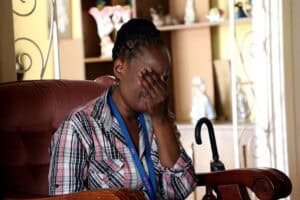The report, which has been sent to the health ministry, advises the government to review sterilisation paperwork.

A South African inquiry into the forced sterilisation of dozens of HIV-positive pregnant women said Monday that their rights had been breached and called for government action.
The investigation was launched in 2015, when two women’s rights organisations approached South Africa’s Gender Equality Commission (CGE) with 48 documented cases of coerced sterilisation.
CGE obtained sworn affidavits from the complainants on the alleged procedures.
“All the women who had lodged the complaint were black women who were mostly HIV positive,” CGE head Keketso Maema said in the report released on Monday.
“Just before giving birth… they were coerced or forced to sign forms that they later learnt through various means were consent forms allegedly permitting the hospital to sterilise them.”
Investigators found that hospital staff threatened to deny women medical attention if they did not sign the paperwork.
Some of the complainants said they were given the forms in moments of “extreme pain” during which they could not fully grasp the content, the report said.
The commission concluded that the women suffered several rights violations and were subjected to “degrading treatment”.
It also accused medical staff of breaching their “duty of care”.
The report, which has been sent to the health ministry, advises the government to review sterilisation paperwork.
A cooling-off period between the signing of consent forms and the operation itself was also recommended.
The health ministry’s spokesperson did not immediately respond to requests to comment.
The total number of people living with HIV in South Africa increased to 7.97 million in 2019 from around 4.64 million in 2002, according to government statistics.
Around 13.5% of the total population was found to be HIV positive last year.
CGE found that the practice of forced or coerced sterilisation for women living with HIV in South Africa’s public hospitals was “cruel, torturous or inhuman and degrading treatment”.
CGE Chairperson Tamara Mathebula said at a media briefing in Rosebank, Johannesburg, on Monday: “We think that forced and/or coerced sterilisation on women living with HIV is a violation of fundamental human rights. This to us, the CGE, is pure discrimination.”
This comes after the Chapter 9 institution received a complaint on March 20, 2015, from the Women’s Legal Centre on behalf of Her Rights Initiative and the International Community of Women living with HIV.
In one case, a complainant suffered depression after she lost her partner because of her inability to conceive due to sterilisation – which is an irreversible process.
In a second case investigated by the CGE, a woman was told that she was being sterilised “because she has too many children”.
Mathebula explained that in another case a woman who was eight months pregnant went to a hospital in northern KwaZulu-Natal where she was diagnosed with TB.
“The doctor informed her that she would need to give birth by C-section. She was informed that she would be sterilised and the doctor allegedly said that women living with TB and HIV should not have children,” Mathebula said.
The commission sampled 15 hospitals in KwaZulu-Natal and Gauteng, where most complaints were lodged.
The public hospitals sampled in the investigation included the Tambo Memorial Hospital in Boksburg, Tembisa Hospital, Edenvale Hospital, Prince Mshiyeni Hospital in Umlazi, Addington Hospital in Durban and the General Justice Gizenga Mpanza Regional Hospital (formerly Stanger Hospital) in Durban.
The CGE further found that the complainants had their right to quality and freedom from discrimination violated.
The practice further violated the complainants’ right to dignity, bodily integrity and freedom and security over their bodies.
In addition, the right to the highest attainable standards of health including sexual and reproductive rights was violated.
The Chapter 9 institution further found that complainants were not provided with adequate knowledge on the sterilisation procedure before being asked to consent, thus violating their right to information.
It was also found that medical staff breached their duty of care to the women. However, due to lost files, it is difficult for the CGE to identify the exact medical practitioners involved in the sterilisation of women living with HIV in South Africa.
“If you cannot find a file, you cannot find who was involved, so that is another trick to escape accountability,” Dr Tlaleng Mofokeng said in response to a question about the legal implications for the medical practitioners involved.
As a result, the CGE has referred its report to the Health Professions Council of South Africa, the South African Nursing Council and the National Department of Health (NDOH).
The body also made several recommendations which include petitions to the South African Law Reform Commission for an amendment to legislation that ensured consent was properly obtained in this practice. It also recommended that where a woman agreed to sterilisation, “they must be given a “cooling off” period in order to fully appreciate the risks and consequences of their sterilisation procedure”.
The NDOH was given three months to report receipt of this report and must stipulate “what concrete steps the department will take in order to ensure the eradication of the harmful practice of forced sterilisation”.
For more news your way, download The Citizen’s app for iOS and Android.






